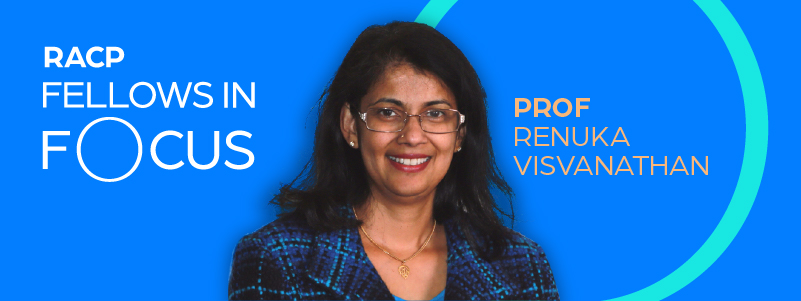RACP Fellows in Focus: Prof Renuka Visvanathan
Date published:
23 Aug 2021

Professor Renuka Visvanathan has an international reputation in the research area of nutritional frailty, and she is especially interested in the provision of quality healthcare to prevent the impact of frailty. For example, falls, fractures and improving the wellbeing, function and quality of life of older people and those with dementia.
Renuka’s positions, accomplishments and interests could fill a book. She has been the Head of the Aged and Extended Care Services at the Queen Elizabeth Hospital (and Basil Hetzel Institute), Central Adelaide Local Health Network since 2005. She’s Professor of Geriatric Medicine at the University of Adelaide, Year 5 Advisor and the Course Coordinator for the Geriatric Medicine and General Practice metropolitan course in the undergraduate medical program, and the Project Lead of the Adelaide Geriatrics Training and Research with Aged Care Centre, as well as the NHMRC Centre of Research Excellence in Frailty and Healthy Ageing. She is a foundation member of the World Health Organization Clinical Consortium In Healthy Ageing, Chief Investigator as well as Executive and Steering Committee member to the Registry of Senior Australians, Governance Committee member (previous Board member) of Resthaven Inc. and until last year, Chair of the Australian Association of Gerontology Research Trust Grant Committee. If that wasn’t enough, she is on the RACP South Australian Regional Committee, on the Geriatric Medical Education and Training Committee of Australia and New Zealand Society for Geriatric Medicine, a member of the Scientific Advisory Board to the International Conference on Frailty and Sarcopenia Research and a member of the Editorial Board of the Journal of Frailty and Ageing and the Journal of Nutrition, Health and Ageing.
It's intriguing to understand how and why she had taken on so much and why she became a specialist. She remarked, “To be honest, I probably just drifted into becoming a specialist. I probably decided after my undergraduate studies that I wanted to do something more than just my degree. I saw becoming a specialist as a natural progression.”
“As I went through my undergraduate years, I got a taste of lots of different specialties. I’ve experienced a bit of psychiatry, a bit of surgery, obstetrics and so on. As you go through that, you tend to get a sense as to which topics you like most. For me, internal medicine was something that I found fascinating and the experience in medical school allowed me to rule out certain things.”
The extent of Renuka’s experiences in the medical field were pulled into focus and she explained to us the skill set necessary for success and the challenges she faced, “I have a favourite saying, 'I'm a jack of all trades and master of none'. However, I think that's a very important skill, because you cut across many disciplines. When everyone becomes focused on a certain thing, it takes one person to have visibility across the many different fields. That’s what the generalist does. You get to connect with your patients, and you bring together many people or resources. That ability to connect is an important skill.”
“The current role that I have has certainly been challenging. There were very few specialists in geriatric medicine at the time that I joined the specialty, and I set out to work in an area where there was a workforce shortage. Upon arrival, I had to build a new academic program, expand the clinical service and all of it in a climate of workforce shortage. Now that I've come out on the other side, it feels very satisfying.”
“Having to establish yourself in a field where you may be the one starting something new can be challenging too. You might become the person who starts that department, and you might be quite young and inexperienced when you're doing that. It's the lack of experience that’s so challenging, but this is the nature of geriatric medicine. With an ageing population, you're sometimes going to be the only private specialist in that area, or you might be the only public doctor in geriatric medicine in a particular hospital. You must build the foundations which can be difficult without peers or a network to give you advice. There’s a lot of trial and error, but that’s the challenging bit.”